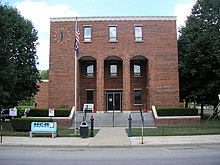Lee County, Kentucky
| Lee County, Kentucky | |
|---|---|

Lee County courthouse in Beattyville
|
|
 Location in the U.S. state of Kentucky |
|
 Kentucky's location in the U.S. |
|
| Founded | 1870 |
| Named for | Robert E. Lee |
| Seat | Beattyville |
| Largest city | Beattyville |
| Area | |
| • Total | 211 sq mi (546 km2) |
| • Land | 209 sq mi (541 km2) |
| • Water | 2.4 sq mi (6 km2), 1.1% |
| Population | |
| • (2010) | 7,887 |
| • Density | 38/sq mi (15/km²) |
| Congressional district | 5th |
| Time zone | Eastern: UTC-5/-4 |
| Website | www |
Lee County is a county located in the U.S. state of Kentucky. As of the 2010 census, the population was 7,887. Its county seat is Beattyville. The county was formed in 1870 from parts of Breathitt, Estill, Owsley and Wolfe counties. The county was named for Confederate general Robert E. Lee.
The town of Proctor, named for the Reverend Joseph Proctor, was the first county seat. The first court was held on April 25, 1870 in the Old Howerton House. The local economy at the time included coal mining, salt gathering, timber operations, and various commercial operations. It featured a post office from 1843 until 1918.
The current county seat, Beattyville, was first known as Taylor's Landing. It was renamed to Beatty in 1850 after early settler Samuel Beatty. The town incorporated in 1872 as Beattyville and became the new county seat due to its location along the Kentucky River.
Although Lee County contained taverns in the 19th century, it is currently a prohibition or dry county.
According to the U.S. Census Bureau, the county has a total area of 211 square miles (550 km2), of which 209 square miles (540 km2) is land and 2.4 square miles (6.2 km2) (1.1%) is water.
Lee County lies within the Eastern Mountain Coal Fields region of Kentucky. The very rugged terrain greatly defines the area. Roughly half of the county lies within the Daniel Boone National Forest. Timber and coal remain economically significant. Harmful effects from strip mining and clear cut logging are still being corrected. The proliferation of kudzu has proved difficult to address. However, with the growing environmental movement and the developing tourism industry more action is being taken.
...
Wikipedia
